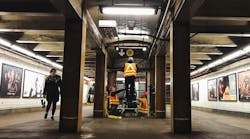Transit Tech Lab releases Proof-of-Concept results with PANYNJ, NJ Transit and NYC DOT
The Metropolitan Transportation Authority (MTA) and the Partnership Fund for New York City’s public-private initiative the Transit Tech Lab has published a report detailing results from its 2024 program. Over the course of eight weeks, beginning in May 2024, 18 innovative startups worked closely with New York-area transit agencies to test their new technology solutions for building a more adaptive transit system, improving customer experience and maximizing the utility of curb areas on New York City streets.
“We established the Transit Tech Lab, as well as our other lab programs, to ensure that government has access to transformative technologies,” said Maria Gotsch, president and CEO, Partnership Fund for New York City. “We believe the 18 technologies demonstrated during this year’s proof-of-concept period provided valuable insights for our transit partner on how technology can enhance their operations and in doing so hold immense potential to improve our city.”
The Resilience, Customer Experience and Curb Activity challenges were announced in January and generated 150 applications from around the world. In May, 18 companies deployed their technologies over an eight-week proof of concept period in partnership with one or more of the participating agencies. This was the first year in which the lab ran three concurrent challenges. The Curb Activity challenge, run in partnership with the NYC DOT, specifically aimed to source, test and evaluate solutions to the problems outlined in the Curb Management Action Plan.
Results highlight how these new technologies can help New York’s regional transit agencies be more efficient, responsive and adaptive to 21st century challenges:
Resilience Challenge – How can agencies build a more resilient and adaptive transit system?
Finalists include Advanced Rail and Transit Solutions, Inc, AlphaRoute, Cascara Energy, CloudMonitoring/REMS Plus LLC, FLX Solutions, Intelligent Security Systems (ISS), Irmos Technologies, QEA and Voltpost. The companies worked with agency partners to:
-
- Conduct a pre-feasibility study to demonstrate how an innovative cooling solution could repurpose $171,000 of excess heat annually at the Brooklyn Third Avenue Subway Station. Install 16 environmental sensors in 12 MTA facilities to protect workers and critical infrastructure via alerts about extreme heating and flooding.
- Proactively inform maintenance needs by installing vibration sensors on three bridges and conducting drone-based thermal energy audits on two administrative buildings.
- Identify 10 MTA and New Jersey Transit (NJ Transit) locations where lampposts could be retrofitted with EV charging capabilities in a cost-efficient way.
Customer Experience Challenge – How can agencies improve customer experience by better communicating service changes, reducing delays and augment safety and cleanliness initiatives?
Finalists include BusPas, Convo Communications, GoodMaps, Urban Solar Inc. and Velocia. The companies worked with agency partners to:
-
- Demonstrate how real time passenger information can improve customer experience and lessen perceived wait times at three NJ Transit and NYC DOT bus stops.
- Launch an American Sign Language (ASL)-translation service for Deaf customers at four MTA and Port Authority of New York and New Jersey (PANYNJ) facilities to improve accessibility of subway and bus stations.
- Test a rewards platform with the MTA and PANYNJ to incentivize engagement and to encourage positive behavior changes with hard-to-reach customer segments.
- Prepare an augmented reality (AR)-enhanced indoor navigation experience to help customers navigate transfers at PANYNJ and NJ Transit’s Hoboken Terminal.
NYC DOT’s Curb Activity Challenge – How can agencies maximize the city’s curb space to serve the multiple and varied needs of New Yorkers?
Finalists include AIWaysion, Appyway, Populus and Seyond. The companies worked with the NYC DOT to:
-
- Evaluate LiDAR and Edge AI sensors as potential solutions to help automate the collection of curb data.
- Perform an assessment of existing data management systems to identify how a curb management software solution could augment and digitize existing curb data inventories.
“The MTA continues to tackle significant challenges while remaining focused on enhancing the customer experience and improving resiliency efforts,” said Jessica Mathew, senior advisor for special projects, MTA. “We’re excited to review the results of this year’s Transit Tech Lab challenges and explore new technology and the opportunities they could provide.”



